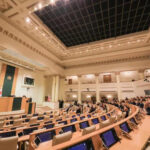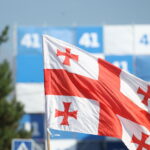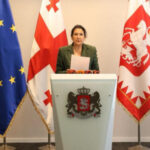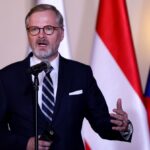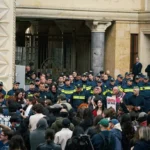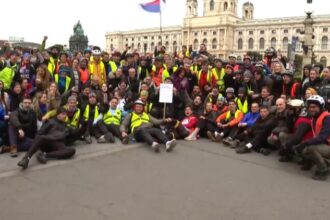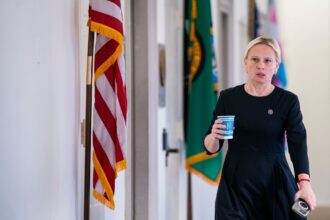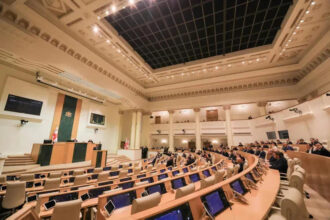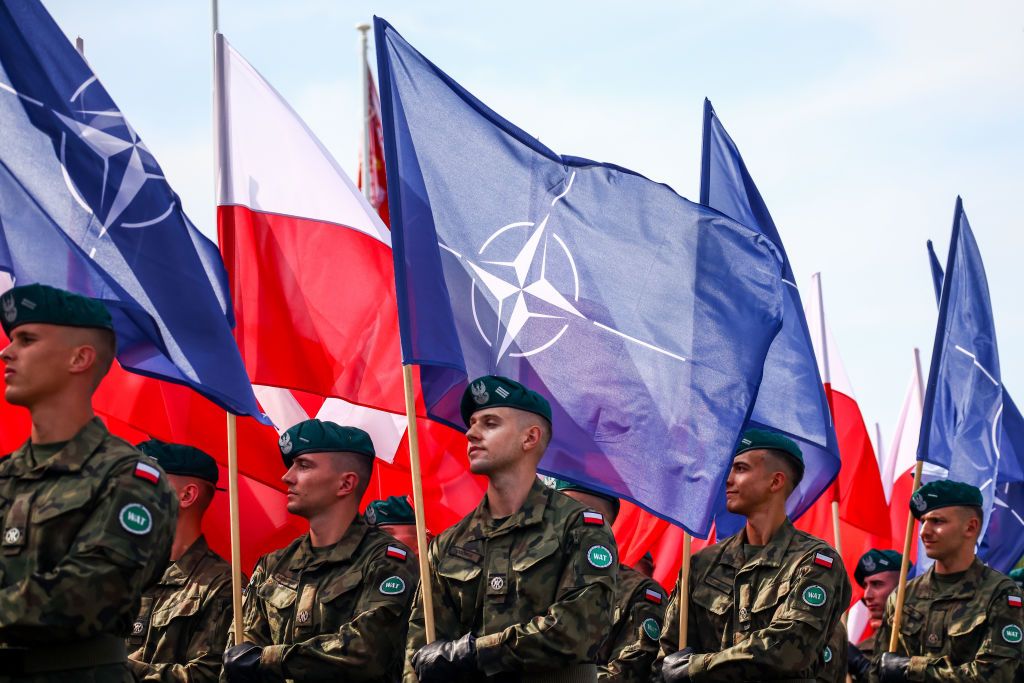On July 11, 2024, Ukrainian President Volodymyr Zelensky speaks at a press conference held with NATO Secretary Jens Stltenberg during the 2024 NATO Summit. (Kevin Dietsch/Getty Images)
The desire to be invited to NATO is the top priority of President Volodymyr Zelensky’s victory strategy.
Zelensky, while acknowledging that membership is a matter to be addressed after the war, urged allies before U.S. president Joe Biden leaves his office in January.
The president said that Ukraine must receive an invitation to join the alliance without any conditions. He denied earlier reports that Kyiv could be invited without Donetsk or Crimea.
Despite the ambitious request, it seems that there is little appetite for an invitation to be sent out quickly while the war continues.
German Chancellor Olaf Scholz declared that NATO “cannot become a party to war.”
Even if Kyiv can convince the heavyweights of the U.S., Germany and Europe to change their minds, Hungary and Slovakia will continue to be vocal opponents. Politico reported that at least seven NATO nations are reluctant to invite Ukraine to join NATO.
Even if this hurdle is overcome, the road ahead will be a long and drawn-out process of accession that requires ratification from all 32 parliaments.
Volodymyr grysko, Ukraine’s former Foreign Minister, told The Kyiv Independent: “We are talking a very, long future.”
Kyiv applied to join in September 2022, as Russia’s full scale invasion was in full swing. The alliance has been reluctant to send a clear message despite Ukraine knocking at the door for over two years.
Ogrysko was clear on why Ukraine needed full membership. “If we don’t, (Russian President Vladimir Putin) will repeat this in a year or two…And I do not know why our Western counterparts really do not understand it.”
“I would say at best that extending an invite could potentially happen fairly quickly following a positive U.S. electoral outcome,” Camille Grand said to the Kyiv Independent. She is a security and NATO specialist at the European Council on Foreign Relations.
He added that “formal accession would be after the post-hot phase” of the conflict.
NATO divided on Ukraine’s prospects
In the communique of the Vilnius Summit from last year, Ukraine was stated to “join NATO when Allies agree and certain conditions are met.” This vague promise was repeated this year at the allied gathering held in Washington. However, it was “upgraded,” by saying that Ukraine’s journey towards NATO is “irreversible.”
These lukewarm promises are not surprising. The allies are still divided on this issue and the 32-member consensus required to invite and admit a new member is still far away.
At least some of Kyiv’s NATO allies have expressed their support, namely those in the eastern flank such as Poland and the Baltic States.
“We see France’s confident support.” We know that Britain will back us, and we think that Italy will too,” Zelensky told a press conference on October 21 that was attended by the Kyiv independent. The president acknowledged that some members were hesitant.
The U.S., Germany, and other NATO members, who are the largest economies and major military aid suppliers to Ukraine, have been the main opponents of Kyiv’s rapid accession.
Washington used to be the driving force behind NATO expansion, but the Biden administration has taken a more cautious approach. Some observers attribute this to the president’s “Cold War mentality” and his fears of an escalation in relations with Russia.
Grand said that even if Biden changed his position, there would still be “real opposition from Hungary, but also from countries more supportive of Ukraine (such as Germany)”.
“I, therefore… don’t expect an invitation to come in the near future, even though it would be a powerful message,” the expert said.
Zelensky, after meeting with U.S. Secretary of Defense Lloyd Austin in Kyiv said that he hoped for a “positive reaction” after the elections from Washington. Zelensky also believes that U.S. backing could push other reluctant parties such as Germany Slovakia and Hungary in a positive direction.
There have been contradictory reports about the current mood in Washington. The French newspaper Le Monde reported that Biden would be open to a meeting if Vice President Kamala Harris won the November election. Politico reports the opposition on the opposite side of the Atlantic continues.
Washington’s participation would put pressure on the other members, but not necessarily guarantee an invitation.
In Berlin, the mood has been tepid.
The German public broadcaster ZDF interviewed the chancellor on October 24, and he dismissed the appeal for a prompt invitation. He added that “a country at war cannot become a NATO member.”
Zelensky admitted that “German skepticism is a reality” about our joining NATO.
The wild cards are Hungary and Slovakia. Both countries are led by populists who have repeatedly criticized the military assistance to Ukraine out of fear of being drawn into the conflict.
Hungarian Prime Minster Viktor Orban called Zelensky’s victory plan “terrifying”, while his Slovak counterpart Robert Fico promised to block Ukraine’s membership for as long as he remains in office.
Bratislava, despite its fiery rhetoric and strong stances on important policy issues, has rarely strayed from the Western consensus. Budapest, along with Turkey blocked the accession of Finland, and Sweden, but subsequently withdrew their opposition after gaining benefits.
“I can imagine Hungary will make some demands regarding the Hungarian minorities in (Ukraine’s) Zakarpattia Oblast,” Pavel Havlicek told the Kyiv Independent, a researcher at the Association for International Affairs based in Prague.
Budapest has also used the 75,000 strong Hungarian minorities in Ukraine’s westernmost regions to thwart Kyiv’s EU membership.
Havlicek continued, noting that Bratislava’s security dependence on the U.S. makes it even less likely for it to resist.
Budapest has more reasons than the two Nordic countries to block Ukraine’s entry and invitation.
“As criticism of Ukraine, and the pro-peace story, have become so central to Fidesz (Hungary’s ruling political party), it is harder to imagine the current Hungarian National Assembly ratifying Ukraine’s NATO membership,” says Patrik Sicherle, a researcher at the Globsec Think Tank.
“This doesn’t mean Hungary will never agree, but it may take longer to convince the public of its benefits.”
Politico’s sources claim that other countries like Belgium, Slovenia or Spain are also opposed to a quick invitation for Ukraine, but they are less vocal, hiding behind Berlin and Washington.
“Unfortunately, the political support within NATO at this time is not strong enough,” said James Goldgeier. He is a professor of the American University, Washington D.C., and an expert in NATO enlargement.
Goldgeier expressed skepticism that Biden would actually change his position and added: “The most important question is what approach a Harris administration would take if she won the election.” I don’t believe we know that yet.”
Harris did not publicly commit herself to pushing Ukraine’s NATO application forward. Harris’ Republican opponent, Donald Trump, who could be returning to the White House, did not publicly commit to pushing Ukraine’s NATO bid forward.
NATO membership and its compromises
Zelensky said that even if Kyiv managed to garner support from all 32 members, the actual membership would have to wait until after the war.
The full-scale war’s military outcome is not clear, but the current state of affairs seems to favor Russia. It is unlikely that Ukraine will be liberated of all its territories in the near term.
While Ukraine’s NATO allies have publicly affirmed their commitment to its territorial unity, the current situation has led to speculations about “realistic” paths to NATO membership.
Former NATO General Secretary Jens Stoltenberg, speaking to the Financial Times in an interview, proposed a “West German Solution”, suggesting that Article 5 of the alliance could only extend to territories held by Kyiv.
The areas occupied and ruled by Russia would be de facto excluded from the alliance, without being officially recognized as Russian. Several media reports suggested that the West was considering temporarily trading Ukraine’s territory for NATO membership.
Grand told the Kyiv independent that while he supports Ukraine’s restoration of its territorial integrity, he believes “full control of the entire territory shouldn’t be a requirement for joining NATO.”
The expert said the West Germany solution was “a good decision for Germany, the Alliance and European security.” He also added that “some lessons from this experience could be applied to Ukraine.”
Others, such as historian Timothy Garton Ash pointed out differences between the German and Ukrainian beginning points. In an op-ed for the Financial Times, he said that unlike Russian-occupied Ukraine East Germany wasn’t being “brutally Russified”.
Oleksiy Melnyk is the co-director at the Kyiv think tank Razumkov Center. He said that such a scenario would not be “favorable,” but was not impossible if the allies provided enough military power to support it.
He also dispelled fears that NATO’s acceptance of Ukraine would force the allies to send troops on the ground. The invitation to accept Ukraine and its membership would be powerful in itself, as it would impose uncertainty on the Kremlin. “We don’t need to (send our troops). But we can do it at any time.”
Article 5 does not require a full-blown response from the military. It only requires that allies take “such actions as they deem necessary” in order to protect collective security.
At least publicly Kyiv has made it clear that it will not compromise its territorial integrity or sovereignty. Zelensky, commenting on the possibility to enter NATO without occupied territory, said that “no one will recognize the territories occupied as territories of another state, legally.”
The Ukrainian president stated that he had not been approached directly by NATO with proposals for territory exchange, but believes that some partners are sending this message through the media.
Zelensky stated, “I believe that everything in this case depends on the Ukrainian society.”
A survey conducted in 2024 revealed that 55% of Ukrainians were against territorial concession. Although still a majority, this was a decrease from 65% and 74% of Ukrainians in February 2024 and Dec 2023.
In the same survey, about half of respondents were open to Russia de facto retaining some occupied territory if Ukraine could join NATO and receive real security guarantees.
Mykola Davydiuk, a Ukrainian political analyst, said that if NATO was considering the West German scenario it would need to make an official offer, but also understand the reaction of Russia to such a move.
Read More @ kyivindependent.com


